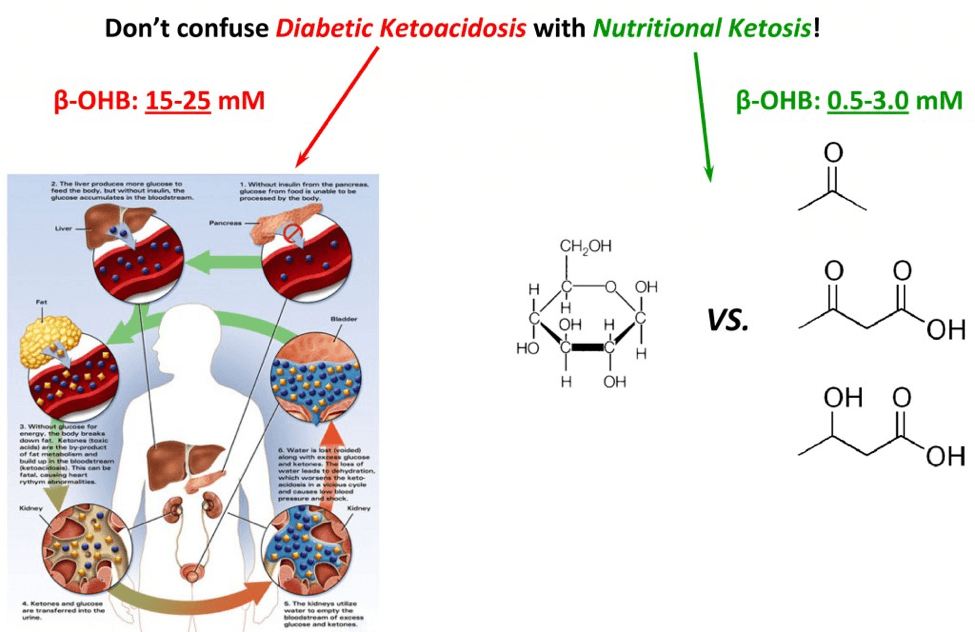You may have heard from your doctor that ketosis is a life-threatening condition. If so, your doctor is confusing diabetic ketoacidosis (DKA) with nutritional ketosis, or keto-adaptation.
First, some semantics. Our body can produce, from fat and some amino acids, three ketone bodies (a “ketone” refers to the chemical structure where oxygen is double-bonded to carbon sandwiched between at least 2 other carbons). These ketone bodies we produce are: acetone, acetoacetone, and beta-hydroxybutyrate (B-OHB). [For anyone who is interested, they are the 3 most right structures on the figure, below.]
Why do we make ketones? For starters, it’s a vital evolutionary advantage. Our brain can only function with glucose and ketones. Since we can’t store more than about 24 hours’ worth of glucose, we would all die of hypoglycemia if ever forced to fast for more than a day. Fortunately, our liver can take fat and select amino acids (the building blocks of proteins) and turn them into ketones, first and foremost to feed our brains. Hence, our body’s ability to produce ketones is required for basic survival.
What is diabetic ketoacidosis? When diabetics (usually Type I diabetics, but sometimes this occurs in very late-stage, insulin-dependent, Type II diabetics) fail to receive enough insulin, they go into an effective state of starvation. While they may have all the glucose in the world in their bloodstream, without insulin, they can’t get any into their cells. Hence, they are effectively going into starvation. The body does what it would do in anyone – it starts to make ketones out of fat and proteins. Here’s the problem: the diabetic patient in this case can’t produce any insulin, so there is no feedback loop and they continue to produce more and more ketones without stopping. By the time ketone levels (specifically, beta-hydroxybutyrate) approach 15 to 25 mM, the resulting pH imbalance leads to profound metabolic derangement and the patient is critically ill.
But this state of metabolic derangement is not actually possible in a person who can produce insulin, even in small amounts. The reason is that a feedback loop prevents the ketone level from getting high enough to cause the change in pH that leads to the cascade of bad problems. A person who is said to be “keto-adapted,” or in a state of nutritional ketosis, generally has beta-hydroxybutyrate levels between about 0.5 and 3.0 mM. This is far less than the levels required to cause harm through acid-base abnormalities.
Keto-adaption is a state, achieved through significant reduction of carbohydrate intake (typically to less than 50 grams per day) and moderate protein, where the body changes from relying on glycogen as its main source of energy to relying on fat. Specifically, the brain shifts from being primarily dependent on glucose, to being primarily dependent on beta-hydroxybutyrate. This has nothing to do with what a diabetic patient is experiencing in DKA, but does illustrate how poorly informed and quick to react the medical community is. DKA and nutritional ketosis (or keto-adaptation) have as much in common as a house fire and a fireplace.
Photo by Andrew Yardley on Unsplash








Thank you for your blog. My wife and I are trying to enter ketosis but I have a doubt: When in a low carb diet is recomended that you eat 1g protein/kg of weight, is that lean body weight or total body weight? I think we are not in ketosis by eating too much protein…
Thanks.
PD: you may want to correct the title of the illustration…(title=”DNA vs NK”) in the html code.
If you’re trying to get into ketosis, it’s more about the absolute amount of protein being limited. A general rule of thumb is that 25% of each gram of protein over 100 gm/day is treated like carbohydrate. Hence, I target about 40 gm/day of carb and 120 gm/day of protein.
Hi Dr. Attia,
First, I would like to thank you so much for your blog and for taking the time to respond to so many questions. I absolutely love reading your posts – not only do they provide a wealth of information in a way that is very understandable, but they are extremely motivational as well. Thank you!
Second, I have a question about ketosis and increasing one’s fat intake. If our meals are made up of 75% or more from fat each day, won’t our body use the fat that we ingest as energy before using our stored fat? So, if we eat a lot of fat, could ketosis just mean that our body is using the fat from our recent meals and not from our body’s fat storage?
Thank you again for the great work that you do!
Yes, exactly. But remember, they only way to to get into ketosis is to consume a high amount of fat (or to starve), because even small amounts of carbs or anything beyond modest amounts of protein shut off the process.
The key is to still consume less fat (actually, less total energy) than your body is burning which, based on the recent JAMA study and a host of others, is probably increasing relative to what it was doing in a high-carb environment.
Dr. Attia – thank you so much for your quick response. I have another question – when you are counting your carbs, do you count the total number of carbs in each serving, or do you deduct the fiber and count only the “net” or “active” carbs? I have read several conflicting views on this, and I would appreciate some clarification. Thank you again, and I really hope you have a book on the way!
Total. It’s a higher bar and easier to keep track of (for me, at least).
I recently spent a month in ketosis and was going really well felt great. No weight loss tho. Lots of water lost I think. Anyway I had severe pains in the stomach and went to er with suspected appendicitis. The doc noticed the ketones in urine and checked bloods. All good including lowest blood glucose level I’ve ever had (I have impaired fasting glucose, pre diabetes) but bicarbonate levels below normal. I was severely dehydrated and he gave me three litres of saline intravenously. My crp level was 45 which I think indicates inflammation or infection. They also found a fatty liver with a hemangioma. Anyway question is, is it possible I was in acidosis with normal blood glucose ? Is this anything to worry about…ie the bicarbonate level or to be expected ? How could I prevent this in future ? Is drinking more water enough or should I have upped my sodium as well ? I wasn’t taking any supplements. I think the pain was unrelated to the ketosis by the way. I was in a deep purple state according to ketostix should I up my carbs in future to stay in a lighter state ? Lastly, why no weight loss do you think ?
You might try buying reverse osmosis water, and adding one (1) tablespoon of good old arm/hammer baking soda, per gallon. But try balancing, with potasium, and magesium as well, I usually try and eat 1/2 “peeled”raw” organic white potato 2x p/d ( this is a resistant starch and will not increase your glucose, level and may reduce it) and take magnesium malate supplements, as directed on bottle “about 150 mg 3x p/d, should also find out what your calcium levels are as well, a good balance of “iums” will reduce acidosis. Do to hiatal hernia I have to deal with acid reflux, and low PH, this works for me but everyone is different.
Peter, I’ve only just stumbled onto your site which I can’t believe, having been paleo/low carb for 10 months now! Decided to check out the link Mark Sisson put on his site recently and am very impressed; very comprehensive and easy to understand, thank you.
I would love to know your thoughts on non-ketotic low carb. My wife and I generally eat low carb, but will eat some occasional bean salads, and maybe some starch after a workout – she probably eats “too much” fruit as well! Because I’m trying to – well, get ripped, frankly – I tend to try to use the carbs that I do eat strategically, i.e. bigger, carbier meals after workouts (a la leangains I suppose) and I do fast for the first half of the day, with more like VLC and calorie restriction on non-training days.
I have heard from *somewhere* (can’t remember where) that really, upping your fat whilst eating any significant amount of carbs is worse than eating a carb-based diet, but this seems like nonsense to me. My wife and I are pretty well “fat-adapted” it seems – I suspect we dip in and out of ketosis with minimal symptoms, and can very easily skip one, two or even three meals. I don’t spend much deliberate time in ketosis because of the muscle building goals, so I keep protein pretty high most days, but for instance over a weekend I will eat minimal calories and mostly fat to try to burn a few ounces of my ass!
I’ll get to the point… I suppose what I’m saying is, we have still vastly reduced our intake of carbs (definitely under 100g per day, probably closer to 50g) – and have upped our fat intake to compensate. Do you know of any reason why this should be harmful – I kind of feel that given how toxic sugar is, any degree of lower carb is a good thing – or do you feel it is it imperative that we aim for ketosis? And if so, any tips for muscle building whilst ketotic?
The non-ketotic LC approach is a great one for many people. It all depends on what you’re optimizing for.
I started a keto diet 8 months ago. I lost a lot of weight, feel better, and watched my cholesterol levels and blood pressure all go down. I feel wonderful. My initial reason for doing this was because my blood sugar levels were rising. They were 120 fasting before staring. So, 8 months later, I get my blood sugar re-checked, again fasting. Still 120. My doctor then did an A1C, as we were concerned. That came back at 4.5! Is there something with being in ketosis that would cause the high blood sugar reading, yet my A1C is fantastic?
It could be a function of many things, including last meal timing, activity level. I assume your A1C was higher than 4.5 the first time?
Dawn, fasting blood sugar levels can also be high due to the dawn phenomenon. And the A1c is an average, you can have highs & lows and have a good A1c.
Dr Attia,
I found your blog almost by accident and it got me hooked almost inmediatly, great Job!
The concept of Ketosis is very interesting for me, and I have a couple of questions:
I’m a 27 yo woman that “suffers” of hyperactivity, I have a huge apetite, but thankfully I don’t gain weight, more or less. Right now I’m about 70 kg (30% of fat) which everyone says is pretty good for my 1.74 mt height. I’d like to try a ketosis diet, but I’m really not sure how to do it or how to start. I’m assuming that the first days are going to be horrible, becasue one of my weak points are pasta and sushi. I don’t eat every day, more likely once a week one or another, not both, but they tend to be pretty big rations because of my apetite. Do you have any suggestions ideas to make this less traumatic? How should I start this process?
Another question, in your glossary it appeard that ketone bodies are produced partially by the kidneys, will a ketosis regime stress them? I ask because I have multiple kidneys stones (7 and 6 on each side) and they are not tratable becasue of the place where they are. I also can’t do a special diet, becasue they are of both types (ureic acid and calcium) so that would mean that I can’t eat almot everything. I’ve been on treatmen since I was 12, but I wanted to ask if there is any connection that I should be aware of.
Thank you!
You’ve come to right spot. Most of your questions are addressed throughout various posts and comments. I’ll also be doing a sort of “Ketosis 101” post in the future to summarize much of this.
Petro of the Hyperlipid website has the same personal experience and wrote a very interesting discussion of it. If you don’t know his website, just Google [Hyperlipid]. It’s near the top. It’s title is Hyperlipid but the URL is something else. The article is titled “Physiological insulin resistance”. I find it a must-read.
Thank you Peter and Jo. In regards to whether my A1C was higher before, I never had it checked. I am not on any diabetic medication, and started the Keto diet to help prevent this. My carbs are extremely low, under 25/day. I always eat breakfast. I have not been exercising much, just walks with the dog.
Was just curious if the changes caused by the diet had any effect on my morning blood sugar. I fasted 12 hours before the test. Interestingly, before I was on this diet, I also fasted 12 hours before the morning blood sugar, and still had a similar reading of 120 fasting. Figured my fasting blood sugar would be much better after being on this diet for so long. So, was upset to see it didn’t make a difference.
I would be interested on your thoughts about hypothyroidism and ketosis.
It’s on the list. Please check coming soon before posting questions.
Does ketosis make you acidotic (my B-OHB can run at around 6mM rather than 1-3mM on Freestyle Optium exceed blood testing) and I wondered if this higher level causes more acidosis and whether this can be a problem longer term?
(I am one of the T1DM you mention who, when in ketosis, can get away with no basal and few bolus insulin doses (perhaps a total of 6u per day) keeping sugars at around 85 despite the low insulin due to this diet. I wonder whether this low level of insulin (often I must have none in my blood stream when in ketosis?) allows me to run higher ketones (6mM) than would occur if I had some background endogenous insulin and whether this higher level is bad from a more acidic point of view?)
(I am not asking re ketoacidosis – with normal blood sugars I think I am less likely to slip into that (but given my normal sugars are due to the diet rather than presence of insulin, am not sure on this point so obviously anyway monitor ketone levels carefully!) but in this question I am asking more about acidoisis produced by 6mM of B-OHB which is after all acidic. I don’t seem to have any respiratory increase which I might expect if I was having to compensate for acidosis, urine is acidic on test sticks but I think that is normal…). many thanks for a great blog, very interesting
It’s important to distinguish between the acidosis I think you’re referring to (e.g., cellular acidosis in a cancer cell with defective mitochondria) vs. some change in overall body pH. Being in nutritional ketosis does not change body pH (though, as the name suggests, DKA does).
Ralph (Aug. 5 comment, above): Interesting comment. I, too, have T1DM, but I’m finding it’s the basal insulin I need to keep doing, whereas my bolus doses have decreased dramatically (total daily dose, basal + bolus, is about 18 units … quite a bit higher than yours, but lower than the 25 – 30 units I used to take before going LC). How long have you had D? Any idea if you still have any beta cell function? I’ve had it 25 years, and I’m pretty sure I’m past the “honeymoon” phase.
Dr. Peter: Terrific website. Thank you! Your site, along with Mark Sisson’s and a few others, is finally helping me to get my blood sugars off the carb/insulin-induced roller coaster. This is huge. And — “lucky” me — my diabetes allows me to get blood-monitoring keto strips covered by insurance … though I’m several weeks in (keeping close tabs on carb and protein intake) and have yet to register anything close to ketosis on the meter (urine strips, yes; blood, no). A little frustrating, but blood sugar control is my main goal for now, and that’s going very well.
Thanks again and all the best for your NUSI projects … sounds very exciting!
Heather
Vancouver, BC
Why does it take time to adapt to ketosis? (Surely it is what normal human beings fall into after 4-6 hrs or so of not eating (eg at night) so it should not take 3 weeks to adapt to?
(I can understand that due to high carb diets people may have chronically downregulated their ketone burning pathways and hence take ~3 weeks to get them back to speed when they first go low carb but, if you go back to a high carb diet after that, you upregulate glucose burning back to normal in 24hrs or so, so why in turn can’t you upregulate ketone burning in (say) 24 hrs if you go back to it relatively quickly after previous, recent ketosis?)
In other words is flipping in and out of ketosis not such a problem as people say once you have got the ketone utilising enzyme pathways running well (and if it is a problem, does it imply ketosis is not a pathway we should be using except in emergencies or as a back up to glucose??).
Many thanks again for a really thoughtful and informative blog.
Anyone will be in ketosis within 36-48 hours of starvation, or about 2-5 days of significant carb reduction in the presence of normal protein. The “adaptation” is more about the body “working out” the kinks — learning how to prioritize fat oxidation and using fat to make B-OHB, rather than glycogen as the primary energy source.
This is a question I have, too.
A related T1D issue … I recently had a cold, which increased my daily insulin requirements, even though my diet remained the same (ie. LCHF). I’m wondering if this brief period of higher insulin hampered my process of keto-adaptation. If so, and if indeed the re-adaptation process is lengthier than carb re-adaptation, then I think it could be difficult for those of us who are pancreatically challenged to remain in ketosis — perhaps non-diabetics as well, if things like illness, stress, hormonal variation etc. tend to cause a rise in insulin levels.
I’m hoping that flipping in and out of ketosis — as you call it, Ralph — isn’t much of a problem, but the difficulties I’m having getting into it in the first place are making me wonder!
Can Ketosis cause tinnitus (the thumping type, not the ringing)? I read that being in ketosis can cause higher blood pressure and there is a vein behind the ear drum. Should I see my doctor?
I am not aware of this complication. Always a good idea to seek medical attention for something like this. Ketosis generally lowers blood pressure significantly, though.
Hi Peter,
Since your level of carb intake is next to nothing, I am curious what you think of diets such as the Perfect Health Diet that recommend getting safe starches to avoid the long and short term side effects of ketosis such as being more susceptible to disease, dry eyes and mouth, and gut cancers farther down the road. Not sure which path I should take right now for best results for the short and long term.
Thanks,
Jared
Try it out and see if it works for you. We’re all a bit different, so there are few “absolute” rules in nutrition. Rule are “relative.”
Dr. Attia,
What would be more logical of why someone in ketosis would not loose weight, too many calories intake, too much insulin production, something else?
Thanks,
Mark
It would imply they are taking in more calories than their body is expending (but remember, there are many ways the body expends energy besides exercise).
Hi Peter
I know you busy as hell, but just had to ask it here (since I think other people might want to know), if you ever encounter anyone like me?
I am still “flirting” with Ketosis as you calling it, you said you struggled to “get in” for 3 months, I am getting in to my 5th now… Since AHS I am doing intermittent fasting and still not much helps…
Which leads me to my question, did you ever encounter in your experience with nutritional Ketosis the next scenario:
Yesterday – woke up with 1.5 on the morning (so happy), decided not to eat until after work, theoretically my Ketones should go up, or at least stay the same right?
2 “Bulletproof coffee” w. 2 teaspoons ghee during the day and nothing else (last one was around noon).
By 6:30PM my ketone level dropped to my usual 0.5. (always going down during the day rather than going up – no matter what I eat, or not eating at all as you can see)
What’s the story???
I’ll check it again today – woke up with 0.9…
By the way, inspired by you, I finally opened my own blog in Hebrew for the folks in little Israel – https://meeverlapaleo.blogspot.com/
Thanks for inspiring me with your material, the more people we’ll get to around the world – the better.
Later buddy
Aviv, activity can in cases increase hepatic production of B-OHB and in other cases decrease it. I wonder if that’s what you’re experiencing? I wonder if you might be obsessing over the numbers (e.g., 0.9 vs. 1.5) too much? [talk about the pot calling the kettle black…]. If you feel well, that would matter more to me. If you don’t, then perhaps resuming your previous diet, which seemed to be doing amazing things for you, would be another idea?
As always, appreciate your respond Peter
Trying not to be obsessed about the numbers, actually didn’t have my strips for a while now.
I was just wondering if there’s any explanation…
Anyway I feel great, many things are moving the right way, I’ll give it few more months and take it from there.
Thing is I really want to give Ketosis a chance, I do believe it’s actually the most healthy natural state for us to live in, and I love the sharp mental aspect thru out the day (no crashes like I use to have)
My theory regarding last year was that I somehow I entered Ketosis accidentally for the first time in my life (becoming very lean, more energetic than the sun itself and in generally almost euphoric) – after reading so much about it, it sure felt like it.
Than I messed it up, trust me I know I did (a lot of Paleo “safe starches” with an increased fat intake is not a good idea), and gained almost 20lbs and now having a hard time going back (weight + Ketotic).
If you think I remember what I ate last year… oh boy…
Hi Peter,
I just stumbled upon you while I was listening to the Ben Greenfield podcast and was really intrigued by your journey. I have been reading a bit of the work put out by Jack Kruse and am beginning my own personal experiment. I love physiology (my favorite class in school). I don’t need to lose weight, but am very very eager to get back into long distance running after I clear up some nagging hamstring issues and muscle imbalances. Lowering inflammation is a key to this journey.
Since I have osteoporosis I am naturally concerned with lowering blood pH and how it may effect bone remodeling. You don’t mention much about this and I get the idea that once I am keto-adapted this should not be an issue. Could you explain this?
Also, currently I only have pH urine strips and I am definitely spilling ketone in the urine—-which I hope does not indicate a low blood pH. In the podcast you mentioned that you constantly monitor your own blood pH. Can I do this at home? I’m a nursing student so I don’t have tons of $$ but would be willing to save up some money if I can check my levels. Any other comments you may have are welcome!
Thank you so much!!
Hi, I was looking through the comments and replies on this post and am wondering – isn’t there some way of eating that you can get/remain healthy without having to constantly measure how much of specific food items you’re eating and keep on testing your blood, etc.?
Of course. The only time one measures anything is during the early stages of ketosis to figure out if you’re there. This is irrelevant for all but a select few.
I came here looking for information about ketosis and acidosis after high anion gap (20mmol/L) and low CO2 (20.5 mmol/L) results on a metabolic panel. Blood pH was not measured. Over the past 21 months, I’ve lost 120 lbs with a moderately low carb (~100g/d) diet, so… I’ve been in a sustained state of mild ketosis for a fairly long time. Given that information, should I be concerned about these values?
Kim, I can’t provide medical advice.
Peter,
I was telling a friend of mine about the ketogenic diet you describe, (which more or less I have been following for about a year now) and he said that he tried it years ago(basically Adkins) and that he got kidney AND gallstones while on it. Is this a potential issue? He claims the ketone bodies are highly acidic, and leach magnesium, potassium and calcium from your bones/body to buffer the blood, is this true? (he owns a health food store)
He also warns that the high protein (don’t know what he considers high) of this type of diet is bad for your brain (brain calcification & dementia were 2 of his concerns) and that while good for weight loss, it is to hard to maintain for long periods of time and requires too much supplementation to work…
Your thoughts?
PK
Ketosis is actually a low- to moderate protein diet. In fact, I consume about 60% of the protein I used to consume. Impossible to comment on the factors the led to your friend’s conditions, though it’s certainly possible a poorly formulated (e.g., failure to balance minerals) low-carb diet could have played a role in these.
Dr. Attia,
I feel so fortunate to have stumbled upon your blog. I started my ketogenic lifestyle February 15, 2012. I have lost 57 pounds, 7 inches off my waist, and brought body fat down from 32% to around 17%. Of the 57 pounds I’ve lost, I estimate that 47 of those pounds was fat loss. All of this was accomplished within the first 6 months. However, in the last 6 weeks I have totally stagnated and hit the world’s worst plateau. I have been following the advice of a trainer/nutritionist that typically works with bodybuilders and physique competitors, and I have now found (due to the information on your blog), I was very likely taking in too much protein (trainer advised 1g protein per pound of “ideal” body weight target). But eating this way, I simply can’t get this last 10 pounds, or 2 inches off my waist.
I found your blog while researching how to eat for a half-marathon that I’m training for. This will be the longest competitive race I’ve ever run (prior to this I’ve only done a few 5k’s). My trainer/nutritionist suggested switching to a Cyclical Ketogenic Diet (basically “carbing-up / carb-loading” on my long-run training days and for the 1/2 marathon on race day). I’m in week 3 of my 12-week designed training program. While I’m in really great physical shape now – and I’m getting Personal Bests in my 5k training runs and rocking 10-minute miles with ease on my longer Saturday training runs – I gain 10 pounds every time I cycle back onto carbohydrates and I get the world’s worst case of the Runner’s Trots because my system just can’t handle all those carbs/fiber. My last training run made me decide I just can’t do that any longer. I spent more time on the toilet before and after my 6-mile run, than I did actually performing the 6-mile run. I don’t want to spend every one of the 13.1 miles of my half-marathon searching for the next Port-A-Potty.
I was so pleased to read your article “How a low carb diet affected my athletic performance (Part 4)”. I am going to have my trainer/nutritionist check it out with me at our next meeting. And I now plan on running this marathon on Ketones – not carbs!!! And I believe I’ve discovered, through your blog, the key to get these pesky last 10 pounds off (I will reduce protein intake now to 1-1.5g protein per kg instead of 1g/lb…so will now be eating only about 80-120g protein per day instead of 175-180g). The best part of that is that I will get to replace those calories with more yummy fat!!!
For the naysayers and curious out there…when I switched to a ketogenic lifestyle I had my Primary Care Physician run exhaustive blood and vital statistics panels (every six weeks) to make sure what I was doing was safe. ALL lab values and vitals have remained in normal range throughout (and were normal to start). I have been eating this way for 7-1/2 months now. My doctor told me to stop coming in for labs so often. He actually originally advised against a ketogenic lifestyle due to “conventional wisdom” . He was afraid I would get high blood pressure, and that my cholesterol would go up. Neither has happened. I would switch doctors, but they almost all seem to think this way. This is why you must be an active participant in the doctor-patient relationship. In fact, the physician has a PA working for him that is a big proponent of ketogenic lifestyle and they proceeded to get into a little bit of a disagreement about it in front of me one day (I got a good chuckle out of that).
I’ll report back here how I do on my “un-conventional” 1/2 marathon diet. Thanks again for the time and research you’ve put into this.
-Keith
Amazing story, Keith. Congratulations! What does your doctor think today?